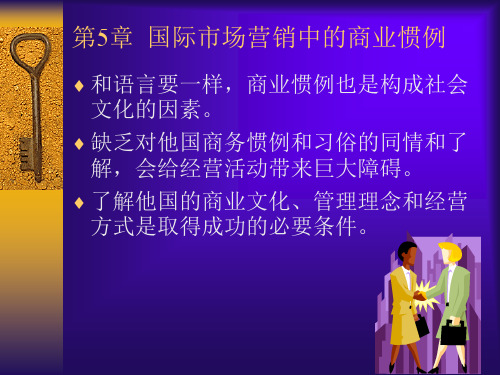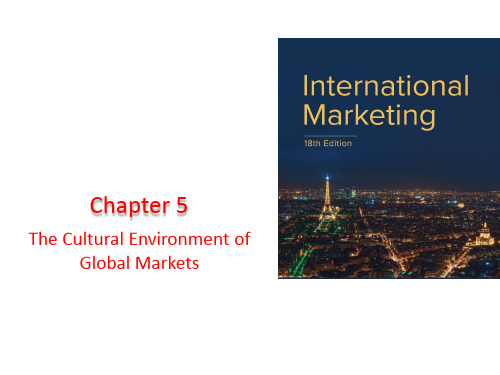- 1、下载文档前请自行甄别文档内容的完整性,平台不提供额外的编辑、内容补充、找答案等附加服务。
- 2、"仅部分预览"的文档,不可在线预览部分如存在完整性等问题,可反馈申请退款(可完整预览的文档不适用该条件!)。
- 3、如文档侵犯您的权益,请联系客服反馈,我们会尽快为您处理(人工客服工作时间:9:00-18:30)。
5-14
H10: There are at least three reasons to focus briefly on American culture and management style:
1. for Americans, it is important to be aware of the elements of culture influencing decisions and behaviors. 2. for those new to American culture, it is useful to better understand business associates from the States as the U.S. market is the biggest export market in the world 3. since the late 1990s, American business culture has been exported around the world
• In high-PDI countries subordinates are not likely to contradict bosses, but in low-PDI countries they often do
5-16
• H11: What are the three typical patterns ?
5-6
Ⅰ . Requireபைடு நூலகம் Adaptation
To successfully deal with individuals, firms, or authorities in foreign countries, managers should exhibit:
• • • • • • • • • • open tolerance, flexibility, humility, justice/fairness, ability to adjust to varying tempos, curiosity/interest, knowledge of the country, liking for others, ability to command respect, and ability to integrate oneself into the environment
If it doesn’t, how business executives should respond to local customs ? Give some examples. The key to adaptation is to remain American but to develop an understanding of and willingness to accommodate the differences that exist
5-2
H1: “Culture not only establishes the criteria for day-to-day business behavior, but also forms general patterns of values and motivations.”. Give examples.
5-15
Ⅲ Management Styles Around the World
1. Authority and Decision Making Business size, ownership, public accountability and cultural values that determine the prominence of status and position combine to influence the authority structure of business.
5-4 5-4
management style
Knowledge of the management style existing in a country and a willingness to accommodate the differences are important to success in an international market. H2: What’s management style?
5-10
2. Cultural Imperatives, Electives and Exclusives
Cultural electives:
• areas of behavior or to customs that cultural aliens may wish to conform to or participate in but that are not required
5-13
H7: How to understand “Master of destiny” viewpoint of American culture? people can substantially influence the future; they are in control of their own destinies.
5-9
2. Cultural Imperatives, Electives and Exclusives
Cultural imperatives:
• business customs and expectations that must be met, conformed, recognized and accommodated if relationships are to be successful
LO1 The necessity for adapting to cultural differences LO2 How and why management styles vary around the world LO3 The extent and implications of gender bias in other countries LO4 The importance of cultural differences in business ethics LO5 The differences between relationship-oriented and information-oriented cultures
5-11
2. Cultural Imperatives, Electives and Exclusives
Cultural exclusives:
• customs or behavior patterns reserved exclusively for the locals and from which the foreigner is barred and must not participate
5-3
Culture, including all its elements, profoundly affects management style and overall business systems. Americans---Individualists Japanese---Consensus oriented & committed to the group Central & Southern Europeans--Elitists and rank conscious Stereotypical though, differences really exist
1. top-level management decisions, 2. decentralized decisions, and 3. committee or group decisions
• • • • Business culture Management values Business methods Behaviors
5-5 5-5
Ⅰ . Requires Adaptation
The necessity for adapting to cultural difference? Adaptation is a key concept in international marketing, and willingness to adapt is a crucial attitude. Adaptation, or at least accommodation, is required on small matters as well as large ones. More than tolerance is required. affirmative acceptance ,that is open tolerance may be needed H3: To successfully deal with individuals, firms, or authorities in foreign countries, what are the basic criteria that managers should be able to meet? (both in Chinese and English)
Culture, Management Style, and Business Systems
Chapter 5
McGraw-Hill/Irwin
Copyright © 2013 by The McGraw-Hill Companies, Inc. All rights reserved.
Learning Objectives
5-8
H5: Business customs can be grouped into three categories, what are they?





